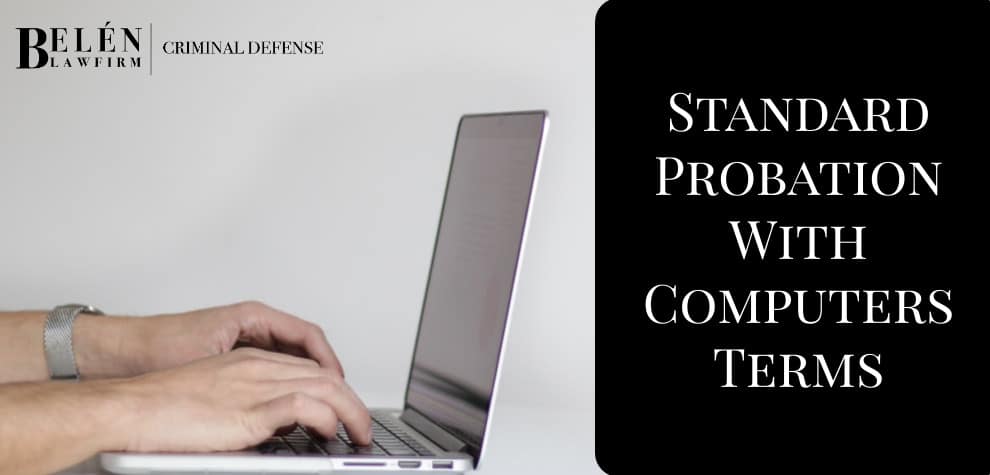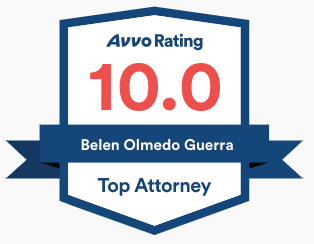Involvement with a computer-related crime often entails digital restrictions while on probations. Standard probation with computers brings set terms and conditions for what’s permitted. These conditions are in place for many reasons. For one, they serve the purpose of deterring future crimes, protecting the public, and providing rehabilitation for the defendant. It also allows probation officers to remain informed of the conduct of the defendant. They may use this information to propose improvements for their condition. By imposing internet probation, future computer violations can potentially be preventable.
In Arizona, internet crimes are a very serious matter. If you’re in legal trouble due to a computer-related crime, you likely have questions about your probation terms. In this post, Phoenix attorney Belén Olmedo Guerra answers your questions surrounding the terms of probation with computers.
What is a computer crime?
Computer crimes can fall under several different categories. They range from offenses that cannot take place without the use of a computer to the use of a computer to carry out the completion of crimes. Offenses that cannot take place without a computer include things like hacking and software recording a piracy. In other instances, someone may use a computer to commit traditional crimes like larceny or fraud. However, most crimes that fall under this category are sex crimes. (See our blog: Lifetime Probation with Sex Offender Terms.)
When you’re placed on standard probation for a computer crime, you can expect severe restrictions to your internet access. More often than not, this comes in the form of constant supervision and frequent searches.
Traditional supervision strategies include using computer software to receive input about the computing environment. It observes their patterns of use and oversees internet and telephone records to gain information about the server.
To determine the terms of your probation, there are several things that must get made known. First, you must present any access to a computer or digital device that provides internet access. This includes devices that are accessible at home or at your place of employment.
You must also provide your internet service providers of both your home and work computers. If you operate or maintain any web pages or social media, you must also make this known. For cases where monitoring software is necessary, you must provide all email addresses, usernames, and passwords.
Who is subject to digital restrictions on probation?
Depending on the type and severity of the crime, you may be subject to digital restrictions while on probation. Most individuals who face computer restrictions are those convicted of sexual offenses involving the internet. This might include child sexual exploitation or child pornography. Other internet-related crimes that may result in restrictions include the following:
- Hacking
- Targeting a computer system to access private information
- Stealing confidential information
- Interfering with internet servers to deny another’s access
- Altering or corrupting data
- Network manipulation
- Terrorism
- Making harmful threats toward a government or its people
- Constructing a computer program to trigger an ill-natured or dangerous act
- Securities and Credit Card Fraud
- Cyber-Stalking
- Online Gambling
- Counterfeiting
- Identity Theft
- Software and Recording Piracy
The terms of the standard probation with computers depend on the details surrounding the crime, local laws, and the judge in charge of the case. Having a knowledgeable criminal defense attorney representing you also plays a large role in the harshness of the terms.
What are the terms of standard probation with computers?
There are many different levels to standard probation with computers. For more serious offenses, the court may ban a person for life from using any computer, digital media, or other electronic or data storage device. Other conditions may forbid a person from internet access or only allow it when approved by the probation officer beforehand.
Many times, an officer must install tracking software on the computer to monitor the actions of the defendant.
In other conditions, you may need to submit your computer to a probation officer for periodic, unannounced searches. These searches are to ensure that the computer does not contain any prohibited data at any time. They’re also to check to make sure the tracking software is functioning properly and whether there’s been any attempts to evade its detection.
Some cases may allow free use of the internet, but you must submit the computers (or other media devices) for occasional searches. Probation officers may only conduct a search when there is reasonable suspicion presented. This suspicion may arise if there’s reason to believe that a violation of the conditions of probation occurred. Searches are to take place at a reasonable time and in a reasonable manner. You’re advised to warn anyone who might have access to the device of these conditions and inform them that occasional searches may take place.
How do they monitor your computer while on probation?
Again, the way your computer gets monitored relates to the nature of the crime. For example, in a terrorism case, a judge will initially determine the rules to your probation. An FBI agent and a probation officer will oversee your activity and watch for any violations.
The probation officer is generally the one who is monitoring your digital activity in real-time. Often, they rely on computer software and tools that track your digital movements. This includes keystrokes, downloads, search terms and site access as well as other activity.
When relying on computer software alone, there might prove to be false alerts. Because certain words trigger the monitoring system, there might be times where the words get taken out of context. An article on “food porn,” for example, might alert an officer that a sex offender with restrictions on pornography has violated their terms. That is why manual investigations are also sometimes necessary.
Contact Belén Law Firm Today
Computer crimes are very prevalent in today’s times, as most things get done over the internet. Only an experienced attorney can thoroughly explain your situation and inform you of your best course of action in this type of case. At Belén Law Firm, we offer aggressive Phoenix criminal defense for our clients. Belén has dealt with various criminal offenses, including those related to internet and computer crimes. If you’re on probation and want to learn more about your computer terms and restrictions, contact us today. Give us a call at 602-715-0908 or fill out a short form online to schedule a free and confidential consultation with a Phoenix criminal defense attorney.




















